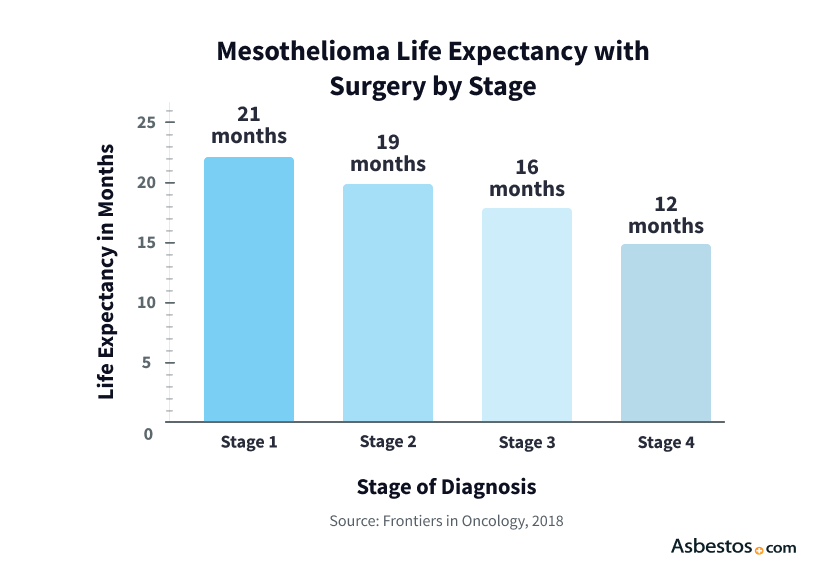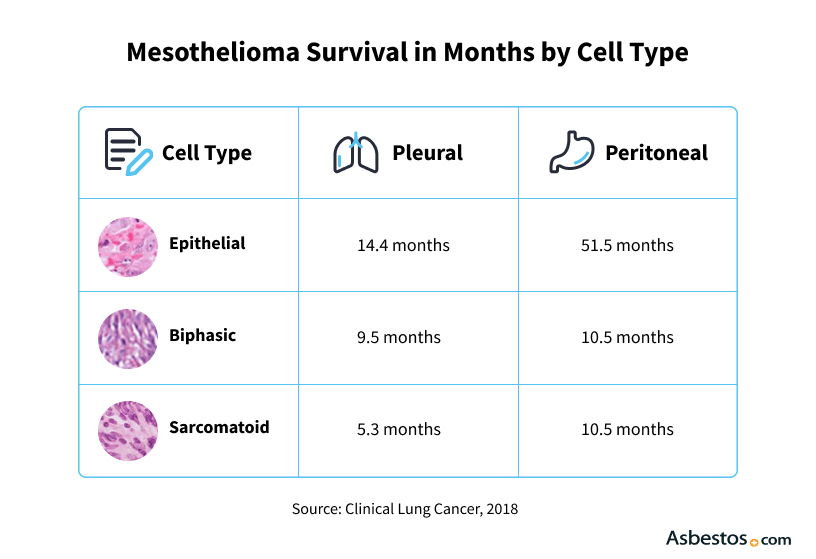In December 2016, Doug Jackson was diagnosed with pleural mesothelioma, and given a life expectancy of just one year. By May 2017, he courageously underwent pleurectomy and decortication surgery at the MD Anderson Cancer Center. Doug’s surgery and follow-up treatments were successful, and he now passionately cares for his family ranch in Wyoming.
Mesothelioma Life Expectancy
Mesothelioma life expectancy varies depending on treatment and individual factors. With treatment, patients typically live 12 to 21 months after diagnosis. Patients without treatment have a life expectancy of 6 to 8 months. Adopting healthy habits and new treatments may extend life expectancy.
What Is the Life Expectancy for Mesothelioma Patients?
Mesothelioma life expectancy is how long a patient is expected to live after a diagnosis. It can vary greatly based on the patient’s treatment. On average, people live longer with treatment than without it.
- Life Expectancy With Treatment: 12 to 21 months
- Life Expectancy Without Treatment: 6 to 8 months
We spoke with Tamron Little, an advocate and a survivor of peritoneal mesothelioma. She discussed her own life expectancy and survival. She said, “The average mesothelioma life expectancy is about 1 to 2 years. Here I am, 14 years later. It’s very rare for a peritoneal mesothelioma patient to live this long.”
Access top mesothelioma doctors, and get help scheduling appointments.
Find a Top DoctorOncologists often find it hard to give patients a precise life expectancy. Many factors can affect how long you live with mesothelioma. An early diagnosis, for example, can improve your mesothelioma life expectancy.
What Factors Affect Mesothelioma Life Expectancy?
Several factors affect mesothelioma life expectancy. These include the stage at diagnosis, tumor location, cell type and the patient’s health. Coexisting conditions play an important role.
You may be able to improve your mesothelioma life expectancy and prognosis in many ways. For example, research shows 12% of treated pleural patients live for 5 years or more. Without treatment, living longer than 6 months is rare.
- Age
- Cancer Types
- Cell Type
- Coexisting Conditions
- Gender
- Genetics
- Health
- Lifestyle
- Overall Health
If you’ve had asbestos exposure, tell your doctor. Report any new or worsening symptoms. People who were exposed to asbestos should be watched closely. It can help lead an earlier diagnoses. An early diagnosis may mean people can qualify to try more therapies.

Connect with trusted specialists who truly care about your health. Get fast, stress-free appointment help.
Find a Doctor NowType of Mesothelioma & Tumor Location
Life expectancy depends greatly on where tumors first form in the body. Those whose tumors begin in the chest typically have a shorter life expectancy. Mesothelioma that starts in the abdomen often means a longer life expectancy. People diagnosed with mesothelioma in the lining around the testes tend to live longer. Tumors on the heart’s lining often lead to shorter survival.
| Mesothelioma Type | Avg Life Expectancy (With Treatment) |
|---|---|
| Pleural Mesothelioma | 12 -21 months |
| Peritoneal Mesothelioma | 3 – 5 years |
| Pericardial Mesothelioma | 3 – 10 months |
| Testicular Mesothelioma | 20 months to 2 years |
Pleural Mesothelioma Life Expectancy
Those with pleural mesothelioma live 17 months after diagnosis, on average. Stage 1 mesothelioma patients have a life expectancy of about 21 months or more. Those with stage 2 can expect to live between 19 and 67 months. In stage 3, life expectancy ranges from 16 to 56 months. By stage 4, patients typically live between 12 and 26 months.
Early diagnosis can help improve life expectancy. Those with an early diagnosis are usually more eligible for surgery. Of those who have surgery, 75% live for 3 years or more. Chemotherapy, radiation and surgery can also extend life.
Peritoneal Mesothelioma Life Expectancy
Peritoneal patients have a life expectancy of about 31 months on average. Aggressive treatments such as surgery help about 50% of patients live 5 years or more. People tend to live longer with prompt treatment.
Tamron tells us she’s thriving years after her diagnosis. She says surgery and heated chemo was the right treatment for her. And she credits HIPEC with her extended survival.
Pericardial Mesothelioma Life Expectancy
Pericardial mesothelioma has a life expectancy of 3 to 10 months. Its location and the difficulty of early diagnosis affect its life expectancy. Early detection is rare, but it can greatly affect a patient’s prognosis.
This type of mesothelioma is rare and aggressive. It develops in the pericardium, the sac around the heart. Because it’s near the heart, treatment options are limited. Surgery, chemo and radiation may help in some cases. They can manage symptoms and extend survival.
Testicular Mesothelioma Life Expectancy
Testicular mesothelioma has a life expectancy of 20 months to 2 years. It has a relatively better prognosis than other types of mesothelioma. It’s extremely rare. It’s so rare that it’s often misdiagnosed. It’s vital to find a specialist for an accurate diagnosis and treatment plan.
It affects the tunica vaginalis, which lines the testes. Some may live longer with prompt and effective treatment. Surgery to remove the affected tissue, plus chemo and radiation, can boost survival rates.
These life expectancy statistics are based on clinical research and apply only to people diagnosed with different types of mesothelioma. The statistics are not indicative of the life expectancy of the population at large.
Stage at Diagnosis
The stage of mesothelioma affects life expectancy. Diagnosis in earlier stages can extend survival. Doctors measure mesothelioma stages from 1 to 4. Each stage describes the extent of the spread of tumors or metastases. Stages 1 and 2 are early stages.
People with early-stage mesothelioma tend to live for 19 to 21 months. Mesothelioma life expectancy is 21 months at stage 1, 19 at stage 2, 16 at stage 3 and 12 at stage 4.

Late-stage mesothelioma involves stages 3 and 4. These patients have a life expectancy of 12 to 16 months. If the cancer spread isn’t significant, you may be able to consider surgery. Stage 4 is the most advanced and final phase. With treatment, life expectancy for stage 4 mesothelioma is 12 months.
Many patients with an early diagnosis are asymptomatic. They show no signs or symptoms of mesothelioma. Doctors should closely monitor those with pleural fluid and a history of asbestos exposure. This is the case even if the effusion is minor or resolves spontaneously.
Cell Type
Tumor cell type affects mesothelioma life expectancy. This is because your cell type impacts which treatment is best for you. Epithelial tumors are linked to a higher life expectancy. Pleural patients with the epithelial cell type have a life expectancy of 14.4 months. Epithelial tumors in the peritoneum raise life expectancy to 51.5 months.
Sarcomatoid mesothelioma cells are more aggressive. They’re also more resistant to treatment. The life expectancy for pleural patients with these cells is 5.3 months. It’s 10.5 months for peritoneal patients. The biphasic type is a mix of epithelial and sarcomatoid cells. It has a life expectancy of 9.5 months for pleural and 10.5 months for peritoneal.

Age, Gender and Overall Health
Age, gender and overall health can all affect mesothelioma life expectancy. Older patients, men, and those with co-existing conditions live shorter lives. In contrast, women and healthier people tend to live longer.
A 2022 review looked at 10 years of study and experience with pleural mesothelioma. The authors note age and gender are “key determinants of survival.”
- Age: Pleural patients at age 40 may live 4 to 9 years. At age 80, life expectancy is between 1 to 3 years. The longer you live with mesothelioma, the better your life expectancy.
- Gender: Mesothelioma stats show about 50% of men survive 5+ years. More than 75% of women with peritoneal mesothelioma live for at least 5 years.
- Health: Chronic illnesses can decrease life expectancy. These include heart disease, COPD, obesity and diabetes
Asbestos exposure, not smoking, causes mesothelioma. But, smoking can cut life expectancy for those with asbestos-related cancer. Studies show asbestos exposure plus smoking raises the lung cancer death rate 28 times.

Discover how mesothelioma doctors personalize treatment plans for you.
Sign up nowMesothelioma Life Expectancy With Treatment
Treatment for mesothelioma can extend life expectancy several years for most patients. Stage 4 mesothelioma life expectancy is about 1 year with treatment. Chemo, radiation and immunotherapy may help late-stage patients live longer.
Tumor location also influences symptoms and complications. Chest tumors raise the risk of respiratory and heart issues. These include shortness of breath and an abnormal heart rate. Peritoneal tumors can cause digestive problems. They can also cause the kidneys and liver to fail.
- Chemotherapy: Alimta (pemetrexed) and cisplatin improve life expectancy more than 100% for some. Chemotherapy is the primary treatment for mesothelioma.
- Clinical Research: Newer drugs and procedures are tested. Some clinical trials use the immune system or genes in your DNA to treat cancer.
- Immunotherapy: Checkpoint inhibitors include drugs like Yervoy. They can boost mesothelioma life expectancy about 30%. Immunotherapy drugs use your immune system cells to fight cancer.
- Radiation: Combined with chemo, it can improve life expectancy. Asbestos cancer patients can see about a 40% longer life. Radiotherapy is a key part of multimodal treatment plans.
- Surgery: HIPEC may extend life 37% for peritoneal patients. Surgery can improve pleural life expectancy more than 45%.
- TTFields: In 2020, the U.S. Food and Drug Administration approved Tumor Treating Fields for mesothelioma. This at-home treatment can extend life expectancy almost 50%.
Jerry Lampe is a survivor of peritoneal mesothelioma. He has lived for more than 40 years since his diagnosis. Initially told he had 6 to 12 months to live, Jerry tells us he found immunotherapy worked for him.
“I say my prayer of thanks for the privilege of another day,” Jerry shares. “It’s my way of not forgetting reality, but I often ask myself why I’m still alive.”
Mesothelioma Life Expectancy Without Treatment
Pleural mesothelioma life expectancy without treatment is about 6 to 8 months. Peritoneal mesothelioma, untreated, has a life expectancy of about 6 months. With any diagnosis, cancer can progress fast without therapy. Some patients feel uncomfortable with cancer treatment. It’s a personal choice if the treatment’s benefits outweigh the risks.
Palliative care, if started with standard treatment, may help. It can increase life expectancy and ease pain and discomfort. Most palliative options are less invasive forms of therapies such as chemo or radiation.
“When I talk to mesothelioma patients about life expectancy, I don’t just share numbers…I help them understand what those numbers really mean. I remind them they’re not statistics. They’re individuals, each with their own journey. My job is to treat the person, not the data.,” Dr. Andrea Wolf, thoracic surgeon and director of the New York Mesothelioma Program at Mount Sinai, tells us.
How to Improve Mesothelioma Life Expectancy
Treatment with a mesothelioma specialist is a key first step. Lifestyle changes can also lead to better overall health. Staying fit can extend your life expectancy. Experts in exercise for cancer patients can help you with a safe fitness plan. A nutritionist can help create a healthy diet for you as well. Consult your doctor before starting any new diet, exercise or therapy.
Be sure to discuss any supplements you’re thinking of taking. Some can cause harmful effects with cancer drugs. The National Cancer Institute says even common vitamins can affect treatment. For example, Vitamin E can have a bad interaction with radiotherapy. It can increase the risk of tumor relapse.
- Consider Integrative Medicine. Complementary therapy includes acupuncture or yoga. Along with proven cancer therapy, it may help reduce your stress and pain.
- Eat Right. Cancer patients need to eat enough protein and calories to recover from treatment. A mesothelioma diet can prevent weight loss. It can also help your immune function.
- Find a Mesothelioma Specialist. Mesothelioma doctors include oncologists, surgeons and others. They can offer you the latest and best therapies at top research and treatment centers.
- Increase Activity Level. “Performance status” refers to how active and fit someone is. It affects how you recover from harsh cancer treatments and how long you may live.
- Stop Smoking. Smoking and asbestos exposure greatly raise the risk of lung cancer. They also reduce mesothelioma life expectancy.
Life expectancy information can be very personal. Remember that support is available. You and your family have access to many resources.
Cancer treatment can be overwhelming. It causes strong emotions and stress. Reaching out for mental health support can help you cope with a mesothelioma diagnosis.
- Authors of a 2024 comprehensive review on pleural mesothelioma emphasize the importance of being able to diagnose the disease as early as possible to improve life expectancy.
- Because early detection can play a significant role in life expectancy, experts urge patients to share their history of asbestos exposure with their doctors.
“Mesothelioma life expectancy varies widely based on numerous factors, including stage at diagnosis, overall health, and treatment approach. However, we now have more treatment options than ever — ranging from surgery and chemotherapy to immunotherapy — that not only extend survival but also significantly improve patients’ quality of life.”
Common Questions About Mesothelioma Life Expectancy
- What is the longest someone has lived with mesothelioma?
-
Some mesothelioma patients live more than 10 years after their diagnosis. Jerry Lampe has lived more than 40 years with peritoneal mesothelioma. That’s longer than any known survivor. Tamron Little has survived 15 years with peritoneal mesothelioma.
Tim C. was diagnosed with pleural mesothelioma in 2002. He underwent an extrapleural pneumonectomy at Brigham and Women’s Hospital. He’s lived more than 20 years since then and attributes his success to the support of his family.
- Which type of mesothelioma has the longest life expectancy?
-
Peritoneal mesothelioma has the longest life expectancy. Heated intraperitoneal chemo has played a key role. A 2018 study found HIPEC gave a median, disease-free life expectancy of almost 5 years. The median overall life expectancy was more than 8 years.
- Does mesothelioma have the shortest life expectancy compared to other cancers?
-
Yes. The 5-year life expectancies for mesothelioma (7.2%), pancreatic (7.3%), and brain cancers (12.8%) are the lowest. Testicular cancer (97%), skin melanoma (92.3%) and prostate cancer (88%) have the highest 5-year life expectancies
- Will remission extend the lifespan of a mesothelioma patient?
-
Remission doesn’t necessarily increase mesothelioma lifespan. A patient in remission has limited symptoms with no noticeable signs of cancer. Tumor cells may still be present and recurrence is possible. Mesothelioma can progress quickly. A long remission often means successful treatment.
- How long do you live after being diagnosed with mesothelioma?
-
Patients live, on average, 12 to 21 months after diagnosis. Early-stage patients may live several years longer. Peritoneal mesothelioma patients often live longer. Surgery, chemo and immunotherapy also extend life.
Life expectancy after a mesothelioma diagnosis varies. It depends on the type, stage and treatment plan. Early detection and access to expert care can improve survival rates. In some cases, patients lived more than 5 years with aggressive treatment.





